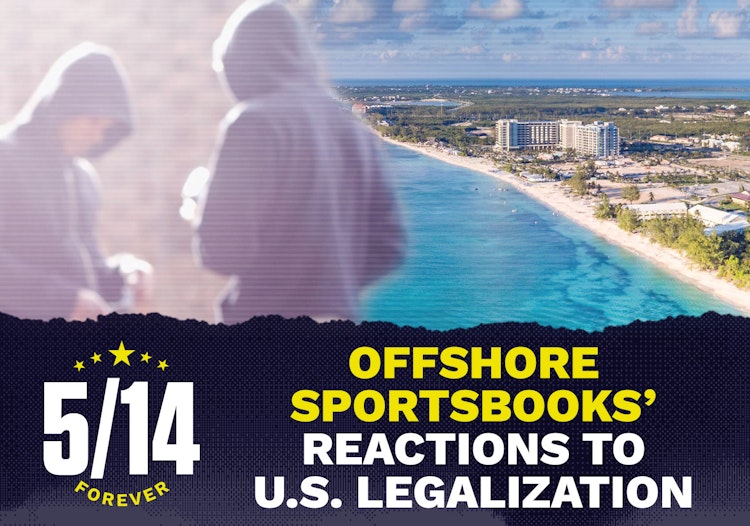5/14 Forever: How are Offshore Sportsbooks Reacting to Legalization in the U.S.?

With the advent of legalized sports betting in the United States, offshore sportsbooks now have more competition than ever before when it comes to online wagering.
Dimers.com contributor Michael Krumholtz takes a deeper look at how these unregulated sportsbooks are threatened by and benefit from growing legalization in the U.S.
Many of these unregulated companies have been serving customers in the U.S. for decades, raking in billions of dollars each year, and a little bit of competition from a suddenly regulated American market isn’t going to send them packing just yet.
Popular sportsbooks in Latin America, the Caribbean and Europe are still taking in massive revenue despite new U.S. competitors entering the marketplace. In 2021, unregulated operators overseas took in an estimated $17 billion in revenue, compared to the $1.7 billion combined that regulated sportsbooks in the U.S. generated. That may be a very conservative estimate as these operations obviously don’t report their exact numbers.
But as dynamics change in the U.S. and more states pass laws to make sports betting legal and widely accessible, will unregulated sportsbooks eventually need to change their gameplans?
Despite a regulated industry of U.S. sportsbooks now having an inside track onto peoples’ phones and computers, offshore sportsbooks still have some distinct advantages. For starters, as long as they’re operating in the black market, they’re not having to pay the hefty taxes and fees that their U.S. counterparts are paying.
And there are still many U.S. states that have not yet legalized or rolled out regulated betting options for sports bettors, meaning those residents are more likely to bet with an offshore company. Plus, even for those bettors in states where sports betting is open for business, many are not going to all of a sudden close their existing accounts. Many will still prefer to shop around at offshore books for the best lines.
However, legalization does pose clear threats to business for offshore companies.
Bovada, arguably the most popular offshore sportsbook among U.S. customers, pulled out of New York and New Jersey in the past few years to avoid problems with local prosecutors. Authorities could now be more inclined than ever to open up more tax fraud and money laundering cases against offshore sportsbooks to protect the states’ new tax revenue streams.
FiveDimes, another popular Costa Rican sportsbook, has seen its fair share of turmoil of late. Recently, it blocked U.S. customers from accessing its site as it awaits the securement of licenses to operate online in certain states. It recently established itself in the Isle of Man, known for its strict regulation, and seen by experts as a logical step toward setting up shop in the U.S.
As the industry here grows, major domestic sportsbooks like Caesars, DraftKings and FanDuel are going to work with state and federal officials to try to diminish the influence of sportsbooks abroad that are evading U.S. authorities.
They will directly benefit from more robust regulation across states. A recent survey from the Fantasy Sports & Gaming Association noted that more than half of bettors in states that have not yet instituted regulated betting bet offshore. Meanwhile, just 24 percent continue to do so in states where the industry is legalized and operating.
Local sportsbooks may also try to work hand-in-hand with the government to create tools that make it more explicit when you’re betting with an offshore site, as many bettors who use offshore sportsbooks do so unknowingly.
When more states legalize and regulate the industry, that should allow U.S. sportsbooks to grow to scale and be able to better compete with the big foreign brands. Surely, they’re going to spend that time reminding you of the safety that comes with giving your money to a regulated sportsbook versus one that operates in the black market.
For the time being, however, offshore sportsbooks are still the big dogs in the industry. If anything, the sudden public interest injected into betting in the U.S. has helped them.
But over the next decade or so, the landscape figures to change in favor of regulated sportsbooks operating within U.S. borders as states put in place more laws and the industry stateside grows.
PointsBet has a tasty 5x $100 Risk-Free Bets offer for new customers. Better yet, they don't require you to roll over any winnings from bonus bets before being able to withdraw.
Related 5/14 Articles: Why the May 14 PASPA Decision was Sports Betting Independence Day
Florida Online Sports Betting in Limbo
Minnesota Online Sports Betting Getting Closer
New Jersey and Sports Betting - So Happy Together
North Carolina is a Sports Betting Sleeping Giant
Massachusetts passes sports betting bill, but hurdles remain






 Swipe across to view more offers
Swipe across to view more offers 








